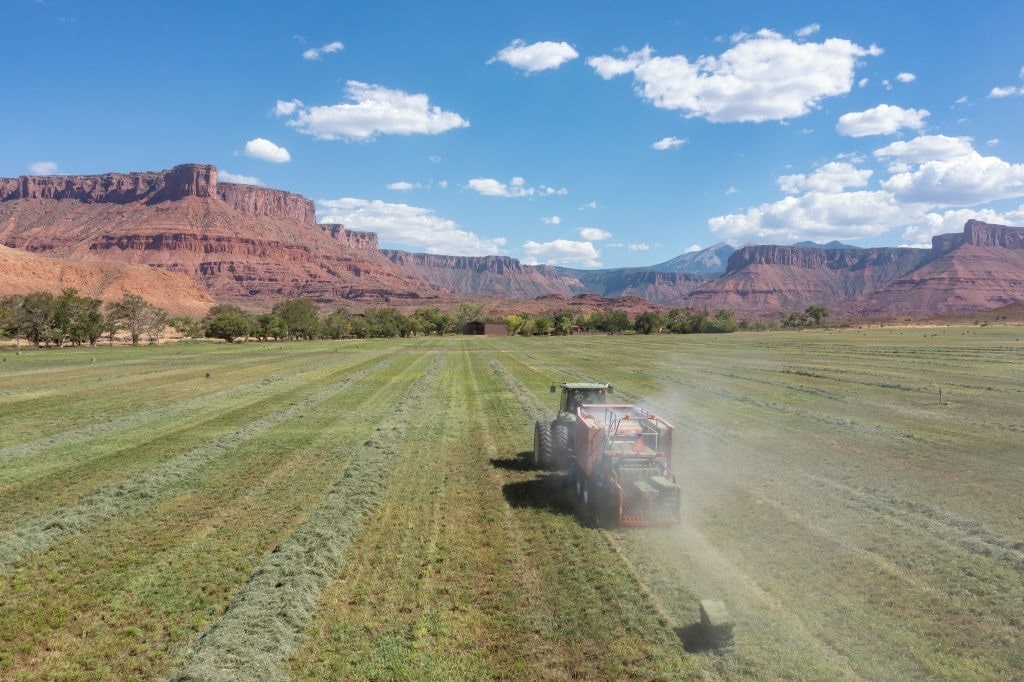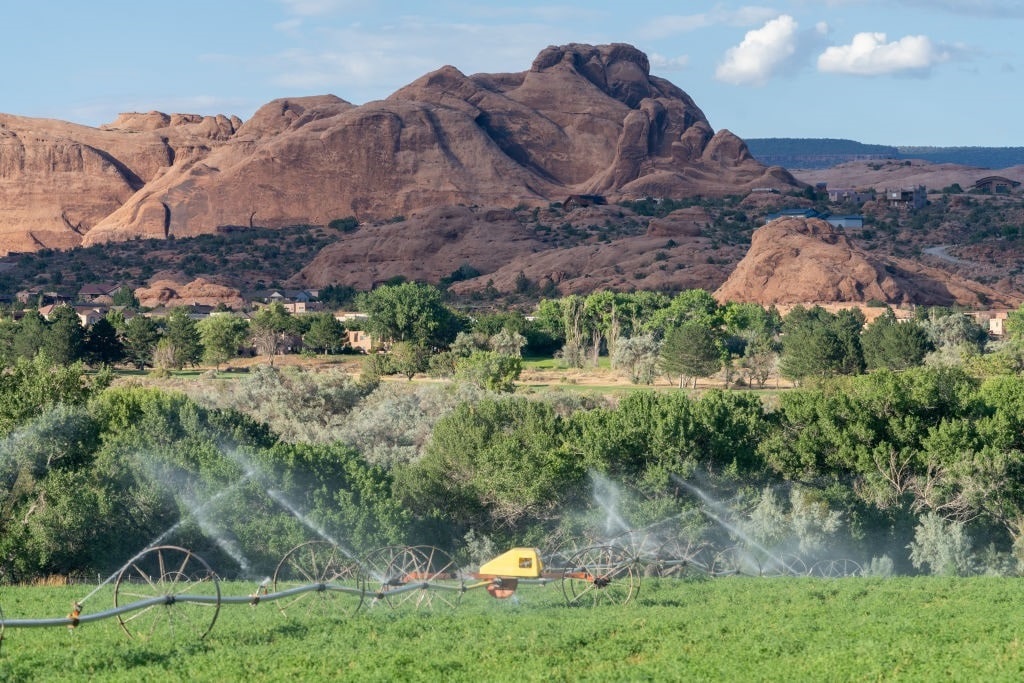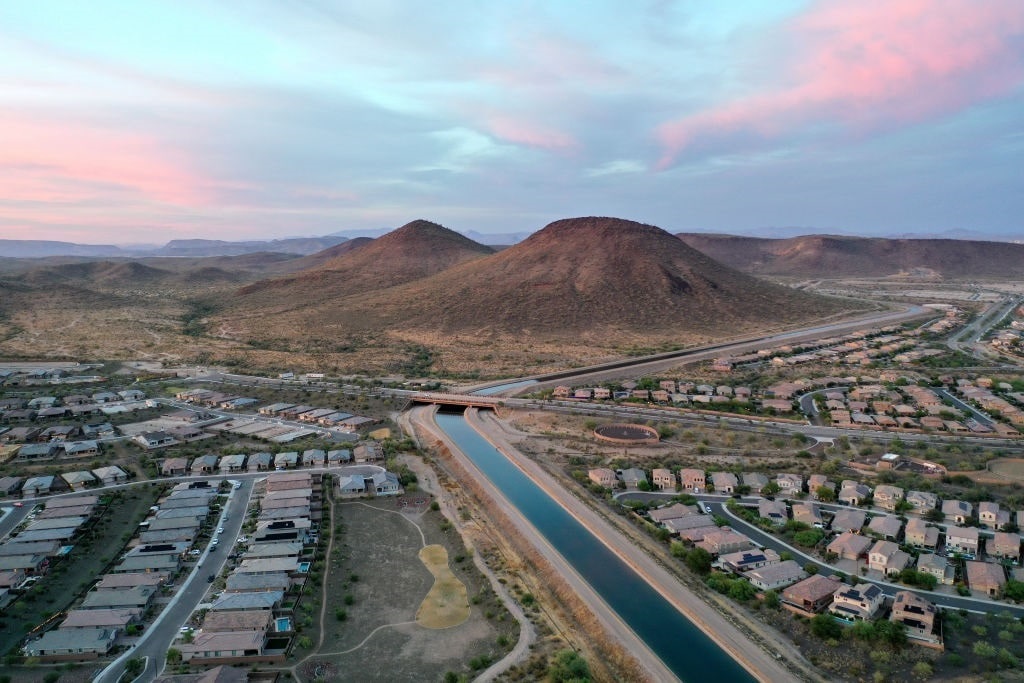An ongoing kerfuffle over alleged Saudi water withdrawals from Arizona to grow alfalfa highlights the complexity of competition for increasingly scarce – and thus valuable – water for crops and residential uses. Revelations about gargantuan volumes of water withdrawn at little cost by a Saudi company to grow hay for export have sparked a passionate dispute that extends outside America’s third-driest state to California and other water-pressed jurisdictions.
Water for Saudi Arabia
The Saudi connection stems from a company named Fondomonte, which reputedly has been withdrawing unlimited amounts of water from lands it leases for merely $25 per acre: The value of the water extracted far exceeds the rent paid. Fondomonte is allegedly growing alfalfa year-round on its 3,500 Arizona acres to ship off to other countries – like China. Outcries of foul play have resulted in an ongoing effort to limit or ban foreign nationals from owning Arizona water rights or to retroactively impose monetary assessments for the water withdrawn.

(Photo by: Jon G. Fuller/VWPics/Universal Images Group via Getty Images)
The issues of water friction will lead to yet more lines drawn in the Arizona sand. Water rights there are big business, as the state endures a crippling, decades-long megadrought that pits farmers and ranchers against newly arriving residents who seek to limit water usage and development. This in turn drives up the cost of housing, water rights, and farmland, creating a vicious cycle that further escalates prices and speculation.
Water Wars Brewing
Issues over water also exacerbate growing cultural tensions. Brad Fain, a multi-generation Arizona farmer and rancher, observes that newcomers “…see farmers as unsophisticated and maybe greedy. They don’t understand our culture, or the complexity of our business.” This urban-rural division grows more intense as Californians and New Yorkers flee high taxes and COVID chaos for sunny climes and retirement. Fain sees the pressures on both sides and is sympathetic.
Arizona is extracting water faster than aquifers and rivers can replenish their flow. Arizona’s key policy dispute arises over whether all growth should be halted or managed to extract the wealth and policies necessary to implement yet more water efficiencies. Agricultural producers have been watching water use as part of their bottom line for decades, investing in modern irrigation technologies and more regenerative practices to reduce their drawdowns while staying in businesses.
Mr. Fain points out an interesting opportunity to balance these competing uses: Employ taxes on development to invest in “closed loop” residential water systems that reclaim and recycle residential water usage. Private drilled wells for housing may not be as amenable to such practices as public water systems. Most residential water can be processed and reused, with the exception of swimming pools, lawn watering, and landscaping. Suburban residents seek to restrict new development, sparking cries of elitism. They want to keep their lawns and water them, too.
Arizona’s Efforts

(Photo by: Jon G. Fuller/VW Pics/Universal Images Group via Getty Images)
The battle lines were drawn four decades ago, when Arizona’s 1980 Groundwater Management Act created “extinguishment credits” to incentivize farms to sell or convert their water rights for development uses. This shifted resources away from water-intensive food production to water-absorbing residential growth. Farming and ranching have steadily declined, but precious water has been sucked up by the suburban sprawl. Rancher and developer Brad Fain “Tools were put in place to augment our water. We have to be very careful with our water.”
Regardless of climate change, anthropogenic water drawdowns have increased the strain on US aquifers and rivers. The coming water wars pit neighbor against neighbor. Brad Fain is sympathetic: “Where are these people to go? They come from all over the world to America seeking hope, and retire to warm climates from up north seeking their lifelong dream. We must build more hospitals and businesses, and we have a nursing shortage and insufficient housing to meet this surging demand. We can conserve more water while supporting reasonable and smarter development.”
Uniting for Solutions
These pressures are hardly unique to Arizona. As the BBC reported in 2014, California was shipping hay to China during a severe drought there, impacting not only water supplies but the viability of American farms:
In the dried-up fields of California’s Central Valley, [some] farmers … are selling their cattle. Others have to choose which crops get the scarce irrigation water and which will wither. … The farmers are making hay while the year-round sun shines, and they are exporting cattle-feed to China. … Japan, Korea and the United Arab Emirates all buy Californian hay. The price is now so high that many local dairy farmers and cattle ranchers can’t afford the cost when the rains fail and their usual supplies are insufficient.
California produces roughly half of all American produce. The water troubles in the American West extend far beyond the borders of Arizona and foretells of a wider conflict for precious resources yet to come. Better water management and conservation are necessary from all sides, whether rich or poor, urban or suburban, black or white, red or blue. In a time of rancorous, divisive “identity politics,” all Americans must identify threats of thirst and starvation as common enemies against which we must forge a united policy response.




